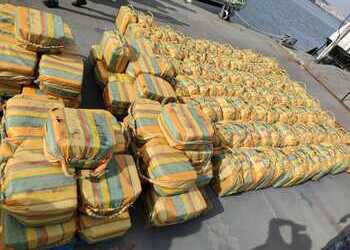Portugal has a problem. In 2022, its cocaine seizures reached 16.3 tons, the highest level in 16 years, cementing its place in the top five European Union countries with the greatest drug seizures. But is Brazil’s leading drug gang, the PCC, really to blame?
Authorities are concerned about what might be underpinning this growing trend. Two recent investigations by Portuguese news magazine Expresso and newspaper Diário de Notícias found that Brazilian police were warning their Portuguese counterparts about the crucial role of Brazil’s largest criminal group, the First Capital Command (Primeiro Comando da Capital – PCC).
Since 2021, Brazilian authorities have allegedly found at least 40 PCC gang members living in Portugal and controlling much of the cocaine trade connecting the two countries, according to the Diário de Notícias investigation, published on January 16, citing a Brazilian judicial source. There is little detail about who these members are or what they might be up to, however.
SEE ALSO: Was a Super Cartel Really Controlling Europe’s Drug Trade?
A real opportunity for the PCC’s expansion reportedly came in the summer of 2022 following two key arrests. First, on June 21, one of Brazil’s leading drug traffickers, Sergio Roberto de Carvalho, was arrested in Hungary. As InSight Crime reported, much of de Carvalho’s empire was based in Portugal, where he owned assets worth millions of dollars, including a charter flight company that he used to move cocaine and cash.
Within a few short days, Rúben Oliveira, alias “Xuxas,” one of Portugal’s most-wanted men, was detained. He was allegedly de Carvalho’s main operator in Portugal, helping to receive and distribute large cocaine shipments as well as launder large sums of money, according to the Portuguese magazine, Visão.
The dismantling of their operation may have left the door open for the PCC, which has allegedly been able to take over some of the drug trafficking routes created by Xuxas, Expresso reported.
“From what we know, de Carvalho was the largest trafficker of cocaine on the Iberian Peninsula. He was also a client of the PCC. From the moment his organization was targeted by authorities, Portuguese traffickers sought to build ties with the PCC. But these too have been arrested, including Xuxas,” said João Amaral Santos, a journalist for Visão, in an interview with InSight Crime.
Essentially, the situation led to reported frustration among the PCC. “Portuguese authorities believe the PCC lost faith in their Portuguese counterparts. Members of the PCC then made themselves available to come to Portugal to set up a proper PCC cell. We don’t know what the status of this cell is,” explained Amaral Santos.
For one Portuguese police chief, the situation is alarming. “Europe is not prepared for this. There is a possible scenario where the PCC wants to control drug trafficking for Europe starting in Portugal,” he said to Diário de Notícias, without providing more details. InSight Crime interview requests to Portuguese police for comment went unanswered.
But it is important to note that, for the moment, specific details about the PCC in Portugal remain lacking. In 2021, this lack of data prevented a senior Brazilian prosecutor from giving Portugal specific information identifying alleged PCC members.
InSight Crime Analysis
Geographically and linguistically, Portugal becoming a rising hub for the European cocaine trade makes sense. If anything, the surprise is that it took so long for this trend to become so apparent.
Nevertheless, the extent of the PCC’s influence in Portugal remains difficult to prove. The claims made in the Expresso and DN investigations speak of several dozen PCC members in the country, poised to expand their control of drugs entering the country. But there is little detail beyond that.
In November 2021, authorities in São Paulo arrested a PCC member carrying a list of gang members abroad. In Portugal, 42 individuals were identified, only as numbers, as having received financial transfers from the gang, according to Amaral Santos, citing São Paulo prosecutor Lincoln Gakiya.
The PCC has a history of members seeking refuge in Portugal or carrying out the occasional drug deal there. In September 2022, Portuguese police arrested Wanderson Machado de Oliveira, also reported to be a PCC member. He was accused of drug trafficking and kidnapping two men he incorrectly thought had stolen 240 kilograms of cocaine that authorities had seized at the port of Sines in southern Portugal.
SEE ALSO: Portugal Fighting Back Against Rising Tide of Cocaine
In November, Leonardo Serro dos Santos, a reported PCC leader, was also caught in Dubai amid unconfirmed reports he had been coordinating activities for the gang in Portugal. He denied all charges against him and was freed after 45 days because Brazil did not make an extradition request in time.
But significant questions remain. First and foremost, the PCC is already part of the drug trafficking partnership that underpins much of the cocaine pipeline to Europe.
Since the 1980s, the ‘Ndrangheta, a mafia network of Italian family clans that share cultural ties but operate largely independently, has been sourcing cocaine from São Paulo, where the PCC was created. This alliance still holds and continues to provide a large percentage of all cocaine heading for Europe. However, Portugal has not been a destination for these cocaine shipments. Instead, the ‘Ndrangheta has its drugs sent to Belgium, the Netherlands, Germany, and Italy.

